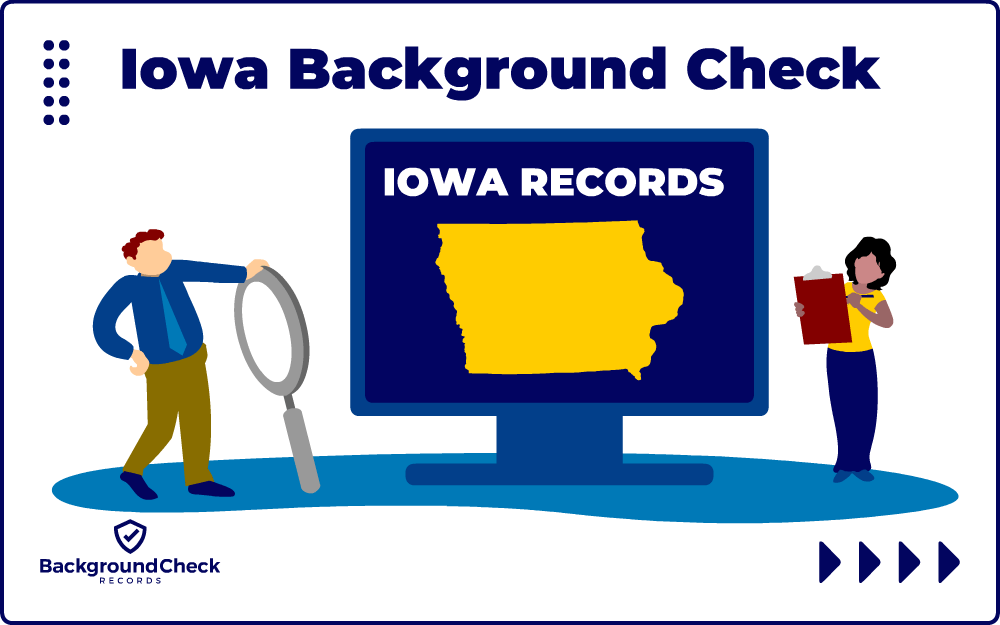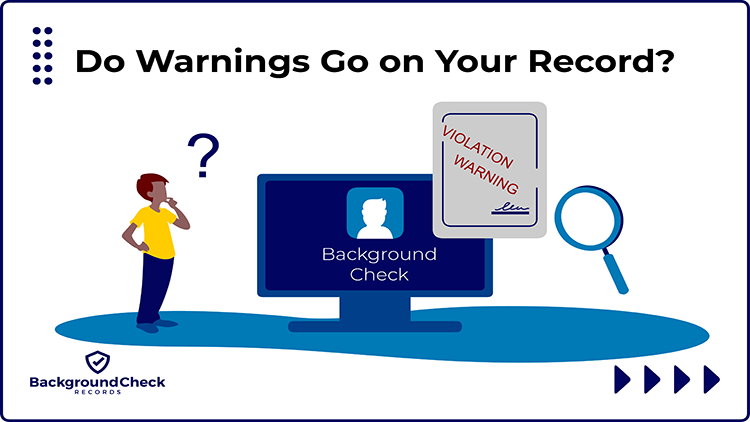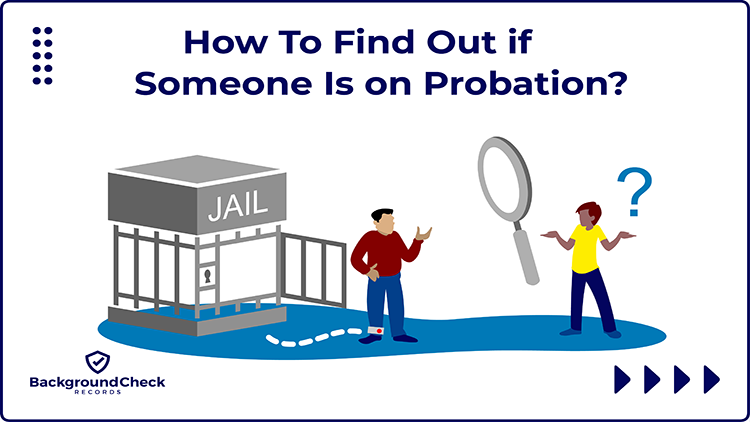Free Iowa Background Check: How to Search Iowa Records (2023)
A free Iowa background check allows individuals and professionals to look into someone’s criminal records, marital status, arrest warrants, probation status, and more through public records or with a click of a button.
Anyone of Iowa’s 3.5 million citizens and even those outside of the state can run a free background check by using the search form above.
But for those who prefer to learn how to search Iowa records in 2023 manually, the information below shows how to dig through public record databases with various agencies such as local courts, federal courts, county sheriff’s offices, police departments, county clerks office, the Department of Corrections and even the FBI.
In addition, for those looking to get an IA background check for employment, licensing, renting, firearms, healthcare, or teaching positions, details such as what shows up, how far back they check, and how long it takes are discussed in depth to avoid digging through several online guides and answer any lingering questions.1
Free Iowa Background Check (Access Free Public Criminal Records in IA)
The majority of criminal records are considered public records and are accessible to anyone who knows how and where to look for them.
Individuals interested in conducting an Iowa criminal background check on themselves can typically access these public records at no cost by visiting the relevant government agency that maintains them. It’s important to note that it is possible to be charged with a crime without being aware of it, making a free background check a useful tool for uncovering such charges.
Those who are looking for professional background checks in Iowa can also utilize some of the free governmental agency sources to access records, but this takes a great deal of time and manpower, so it is best to utilize a third-party site.
Not only does this give a more comprehensive report, it helps ensure the professionals are in compliance with any federal and state laws regarding criminal background checks.
There are a number of ways to look up Iowa criminal history, many of which are free.
Search Iowa Criminal Records Free Using the Iowa Division of Criminal Investigation
Iowa Division of Criminal Investigation provides criminal background reports for offenses charged and tried within the state. There is a fee of $15 per last name search, and written consent is required when it is not a personal search.
In other words, employment, licensing, or tenant screenings must get written consent before requesting an Iowa criminal history through the Division of Criminal Investigation.
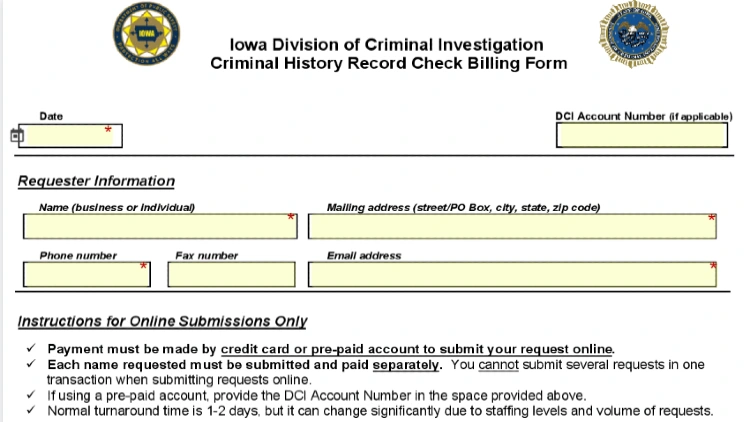
The Iowa Division of Criminal Investigation Criminal History Record Check Billing Form can be filled out online and requires a credit card to cover the small fee. Results can be received in as little as 24 hours.
Requests can be made online, via mail, by fax, or in person. In-person requests for personal records are processed at the time of the request. Third-party requests, even when made in person, the request must be dropped off and will be processed through normal timeframes for non-personal record checks.2
Locate Free Iowa Federal Criminal Records Though the United States Courts (PACER Case Locator)
Federal criminal offenses are tried in the United States Court locations listed below. PACER (Public Access to Court Electronic Records) is where someone can research federal criminal cases. PACER does require a person to open an account, and there is a nominal fee to review federal criminal records.3
Find Iowa Criminal Records for Free Using Court Records
Court records can be accessed through the court’s online portal. For those who are parties to an action, the Iowa Judicial Branch Electronic Document Management System provides the means to access their personal court documents.
For the general public, try this search of the separate online portal, Iowa Courts Online, that will provide information about the case; however, court records/documents cannot be accessed via this link.4
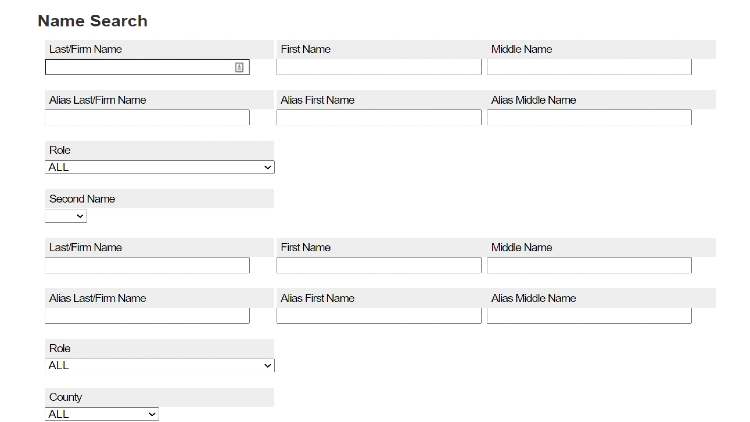
Unfortunately, those usually subject to a secret indictment cannot get this information from the courts and often don’t find out until they are served with an arrest warrant and taken into custody.
Search Criminal Records Free Using Iowa Local Law Enforcement Agencies and Sheriff Departments
Another way to get criminal records in Iowa is to go through local law enforcement or sheriff’s departments. Iowa has 99 county sheriff’s departments and 112 municipal police departments that maintain incident reports such as traffic accident reports, responses to calls, and other records.
In addition, three state universities have their own police departments that cover incidences on each respective campus. Eastern Iowa Airport has its own public safety department handling criminal complaints on airport property, and the Meskwaki Nation has its own tribal police department.
For example, searchers can access the Henry County Sheriff’s Department Inmate Roster online which provides the name of the person incarcerated, release date, jail ID number, charges, and age of the inmate. This is one example of a sheriff’s department and how to access information.
In addition to online searches, a person can call or visit the local sheriff’s department to get information on inmates.
Municipal police departments also maintain records on calls and violations within their jurisdiction. For example, Des Moines Police Department processes records requests online, by mail, and in person. Requests are usually processed within three to five business days depending on the information requested.
Free Iowa Public Record Check Through the County Clerk of Court’s Office
Knowing how to search Iowa records through the local clerk of court’s office can reveal if a person was convicted of a crime. Iowa has eight judicial districts, with all the districts except 4, 6, and 7 broken into smaller sub-districts.5
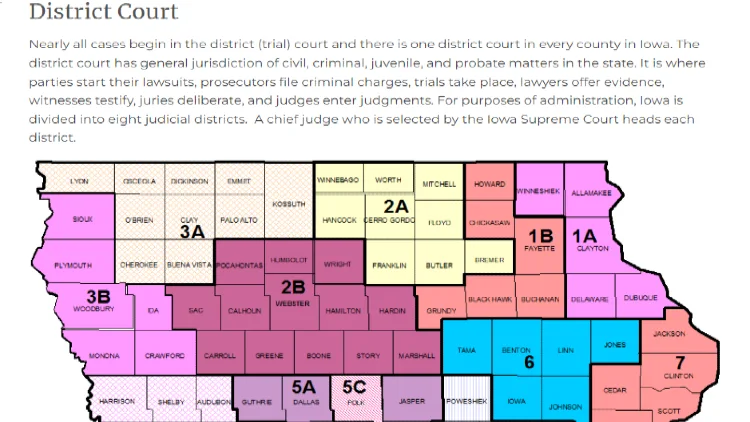
Each district has a clerk of the court’s office that maintains all the records for the court. The kinds of public records that can be accessed through the Iowa district clerk of court’s offices include the following.
- Criminal history
- Divorce
- Civil actions/small claims actions
- Liens
The clerk’s office maintains public computer terminals where individuals can look up records free of charge. Hard copies or copies placed on removable media (such as flash drives or CDs) do have a small fee based on the number of pages, postage, and staff time to find and reproduce the record.4
In addition to the agencies listed above, there are other ways to find out if someone has a criminal history in Iowa.
Locate Free Iowa Criminal Records Through the Department of Corrections (IDOC) Inmate Search
Iowa Department of Corrections maintains an online search portal to locate individuals who have been tried and convicted of a crime in Iowa and sentenced to prison in the state.6 Searches can be done by inmate name or inmate number. Search results show the offenses for which the individual was placed under IDOC supervision.
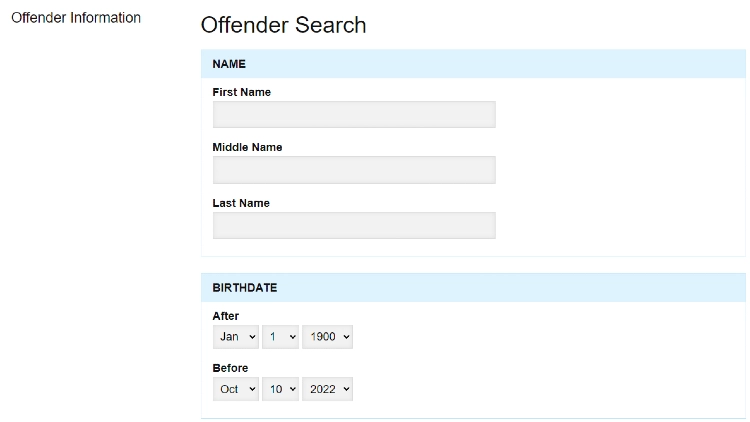
Check Iowa Criminal History for Free Through the National Sex Offender Registry or the Iowa Sex Offender Registry
Free checks of sexual assault criminal history can be conducted online using the Dru Sjodin National Sex Offender Registry or the Iowa Sex Offender Registry.
These sites only provide data on sex offense convictions, not a complete criminal history; however, the information on these sites can be used in a personal Iowa background check for potential dating interests, possible home childcare, or other personal uses.
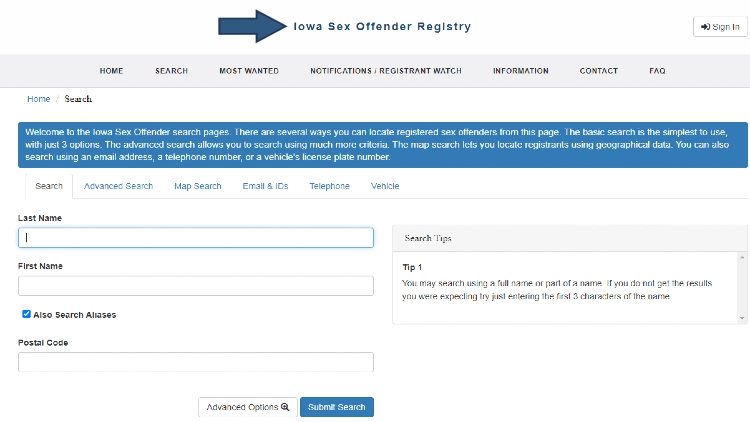
Using the Professional Licensure online portal, individuals can look up information on those who have an Iowa State professional license including details about the license and if there was any disciplinary action taken against the person.
Criminal records are just one type of records that people search for. There are other types of records and different types of background checks that can be performed.
How To Check if Someone Is Married or Divorced in Iowa
When someone is thinking of getting married, they may want to know if their future life partner has been married and divorced before. In Iowa, these records are maintained by the Iowa Department of Public Health, Vital Records Division.7
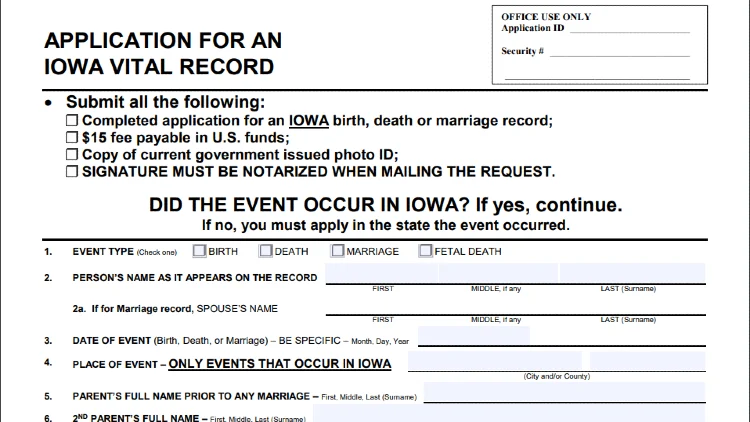
Marriage Records
Marriage records are considered confidential in Iowa, so the only people who can obtain copies of marriage certificates or records include the person listed on the record or their spouse, the child of the person or persons on the record, grandparents to the individuals listed on the document, legal parents of the person listed on the record, siblings of the parties listed, or legal guardian or representative.
Siblings, legal guardians, and legal representatives must provide documentation showing they have the right to the record. Requests must be made in writing and require payment of a $15 fee.7
Divorce Records
A divorce is an action by a court dissolving a marriage; therefore, divorce records are considered court records. Court records are generally public in nature unless they have been ordered sealed by a judge.8
To obtain divorce records in Iowa, searchers would need to submit the request to the clerk of court’s office in the district where the action was heard. Therefore, it is important to know where the divorce was filed and finalized to obtain a copy of the record.
Reasons State of Iowa Criminal History Record Checks & Background Checks Are Used
There are a number of reasons why a criminal history record check and a background check may be performed other than personal reasons. These include the following:
- Employment (pre-screening and continuous screening background checks)
- Working with vulnerable populations such as children, the elderly, or disabled individuals
- Working in public health or safety
- Executive level positions (C-Suite positions)
- Licensure
- Rental applications
- Firearms background checks
- Non-profit background checks for volunteers.
Background checks, such as a level 3 background check, are also used to verify employment history and education credentials. Whether getting fired goes on your record or not, there are no state or federal laws in Iowa that restrict disclosure. Typically, it does not appear on a background report; however, it may be disclosed when human resources contact the previous employer for employment verification.
There are a number of reasons a person may undergo a background check in the state of Iowa, and official background checks are used extensively in the world today.
Free Iowa Criminal Background Check: IA Criminal History Search
When conducting an Iowa criminal history search for official uses (professional uses), there are certain laws and regulations that must be followed so the search and use of results are in compliance with state and federal laws. Background checks must comply with the Fair Credit Reporting Act (FCRA) regarding credit history and Title VII (Civil Rights Act) regarding how information can be used.
The agency that performs background checks in Iowa is the Iowa Division of Criminal Investigation (IDOCI), which may act as the point of contact for nationwide background checks.
The table below outlines agencies in the state that conduct or require background checks, and the reason why these checks are requested or performed.
| An Agency That Conducts or Requires Background Checks |
Reason for a Background Check |
| Iowa Department of Public Safety, Division of Criminal Investigation |
- Employment
- Licensure
- Healthcare
- Public Safety
- Childcare
|
| Department of Human Services |
- Teachers
- Childcare Workers
- Public Health and Safety
- Dependent Adult Care Workers
|
| Iowa Real Estate Commission |
- Realtors
- Salesperson
- Brokers
|
| Bureau of Professional Licensure |
- Athletic Training
- Barbering
- Behavioral Science
- Cosmetology Arts and Sciences
- Dietetics
- Hearing Aid Specialists
- Massage Therapy
- Mortuary Science
- Nursing Home Administrators
- Optometry
- Physical and Occupational Therapy
- Physician Assistants
- Podiatry
- Psychology
- Respiratory Care and Polysomnography
- Sign Language Interpreters and Translators
- Social Work
- Speech Pathology and Audiology
|
| Iowa Board of Medicine |
- Medical and Surgical Personnel
- Acupuncturists
- Nurses
- Nurse Aides
- Genetic Counselors
|
There are multiple reasons someone may request a background check in Iowa. These are handled by various federal, state, or local agencies depending on the type of check, the person making the request, and the information needed.
Firearms Background Checks by FBI and Local Law Enforcement
Individuals purchasing a firearm from a licensed firearms dealer in Iowa must undergo a federal criminal background check. This check is conducted by the Federal Bureau of Investigation which includes a NICS (National Instant Criminal System Background Check).
Iowa is considered a partial point of contact for these checks, which means that the local sheriff’s department submits the information to the FBI when someone requests a permit to purchase or a concealed carry permit request.
The local background checks are optional, meaning that a person can opt to have a local background check completed by the sheriff’s department, or they can elect to have a NICS check without going through the permit process with local law enforcement.9
Employment Background Checks by Iowa Division of Criminal Investigation
Criminal history checks for employment purposes are conducted through the Iowa Department of Public Safety, Division of Criminal Investigation. This background check includes arrests (where fingerprinting was completed), convictions for misdemeanor and felony offenses, and sentencing information.
A restraining order from the Iowa Division of Criminal Investigation typically does not appear on your record unless there is a charge of violating the restraining order. Dismissed charges do not show up on a Division of Criminal Investigation background check.
Criminal history checks are completed for a number of positions both public and private. Iowa currently does not have a “Ban the Box” law limiting employers from asking about criminal history; however, the Division of Criminal Investigation does require consent to search someone’s history when requested by a third party.
State law also prohibits anyone other than the Division of Criminal Investigations from sharing a criminal background check with anyone. Therefore, an employer cannot share a criminal history report with the employee or prospective employee.10
Healthcare Background Checks By Department of Public Health
Iowa Statute 135C.33 states a background check of criminal history and abuse allegations must be performed before an individual can work in certain healthcare positions. The Department of Public Health uses the SING portal to conduct checks on the following:
- Waiver-based home and community programs
- Hospice or end-of-life care
- Adult day facility caregivers
- Home-care assistants
- Home health nurses or aides
SING (Single Contact Repository) is maintained by the Division of Criminal Investigations and was established to give qualified agencies quicker access to criminal records.
Teacher Background Check by The Board of Education Examiners
Individuals who wish to teach in Iowa must undergo background check initiatives by the Board of Education Examiners (BOEE).
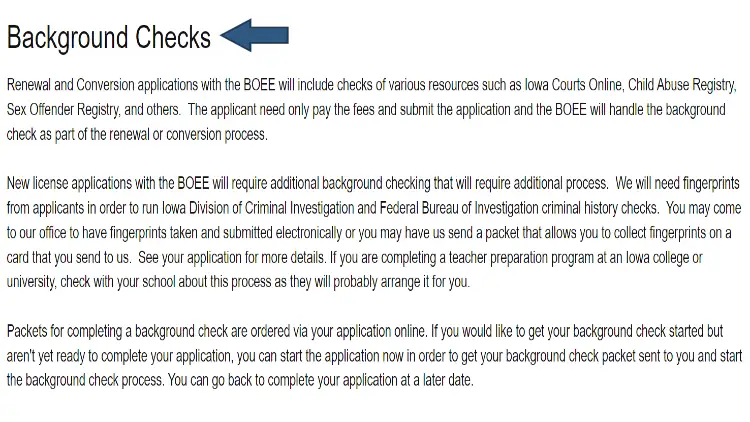
This check includes a fingerprint search conducted by the FBI for criminal history, a search of the National Sex Offender Registry, and a search of the Child Abuse Registry through the Department of Human Services.11
Name Based Background Checks by County and City Agencies
Real estate searches (property ownership and any actions against property owners) are often name-based and can be conducted in a specific geographic area. For example, Des Moines, Polk County, Iowa real estate records can be found through the Polk County Recorder. Searches can be done through the online portal.
Results can show who owns the property and if there are any liens on the property due to unpaid taxes, debts, or other matters.
Name based searches can also be conducted at local jails to see who has been arrested and why they are in custody. An example of a name-based search of an inmate roster is a search of Linn County Sheriff’s Office reveals a list of all inmates in the facility including both those sentenced to jail terms and those with pending charges being held awaiting a hearing.
There are several agencies that require background checks to work, volunteer, obtain licensing or conduct official business in the state.
What Is on a Background Check in Iowa? What Shows Up?
Understanding how to search Iowa records is only half of the equation. Learning what shows up gives a better understanding of how IA background checks operate. What shows up on a background check in Iowa depends on the agency conducting the check, what it is being used for, and how much information the searcher has requested.
For example, a background check for teaching licensure will be more extensive than that for a retail clerk in a local store.
Iowa does not have restrictions on what can be searched in a background check, so it can include any criminal history that has not been sealed or expunged by the court. A criminal history can include:
- Misdemeanor convictions
- Felony convictions
- Pending charges
- Arrests/Warrants
Whether traffic violations appear on criminal background checks depends on the type of screening conducted. For jobs that require the use of a motor vehicle, a driving check is routine to make sure the operator is not a risk to the business.
Iowa background checks can also show credit history and rental history for those screenings conducted on prospective tenants. While Iowa doesn’t restrict what can be searched, information regarding credit history must comply with the FCRA requirements.
Do Warrants Show Up on an Iowa Background Check?
Typically warrants do not show up on a criminal background check in Iowa. Warrants are issued by the court and are served by local law enforcement. Law enforcement may or may not publish active warrants on their websites.
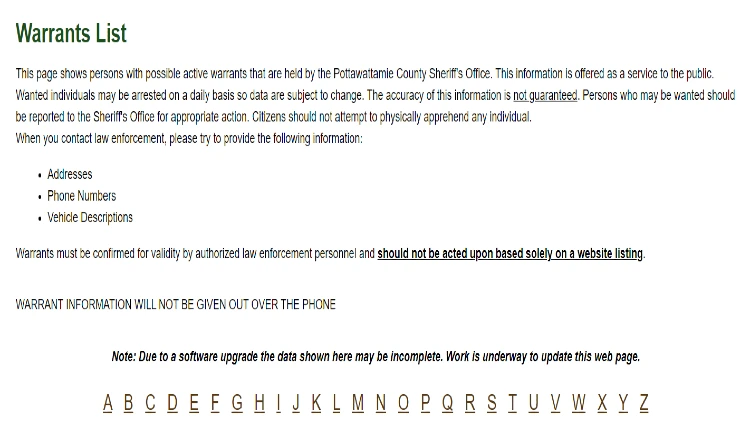
For example, Polk County Sheriff’s Department does not have a public warrant search portal, but Pottawattamie County Sheriff’s Office does have an online list of active warrants.
Does Probation Show Up on Background Check?
Probation in Iowa is considered a court record and typically appears on a background check unless a judge has ordered it sealed or expunged.
A criminal history can have a huge impact on a person’s ability to gain employment or housing. There are several offenses that can negatively impact a person’s future in Iowa.
Iowa: Background Check Disqualifying Offenses
Disqualifying offenses are those that prevent a person from performing a certain job or duty. These can vary depending on the nature of the job.
Disqualifying Offenses for Medical Licensure in Iowa
Medical professionals in Iowa are screened to make sure they do not have any of the following disqualifying offenses on their background. These offenses are:
- Substance Abuse Offenses
- Sexual Assault or Sex Offenses
- Violent Crimes
- Dishonesty Offenses (such as larceny or bribery)
- Public Health Matters (such as abuse of children or elderly or dependent adults)
- Other disqualifications can include weapon offenses or hate crimes.
- Violations of professional codes of ethics.12
General disqualifying offenses for employment can include the following:
- Convictions for violent felonies such as homicide, sexual assault, or crimes causing bodily injury.
- Weapons offenses, include committing crimes with the use of a deadly weapon, such as armed robbery.
- Certain motor vehicle offenses such as DUI/DWI or hit and run (especially for jobs that require the use of a motor vehicle).
- Child or adult dependent abuse or neglect.
- Offenses involving public trust or moral turpitude.
Any criminal conviction has the potential to be a disqualifying offense. The Equal Employment Opportunity Commission provides guidance on how to use criminal history when making employment determinations and criminal history should be weighed against how it will directly impact a person’s ability to perform the duties of the job.13
The type of information that appears on a background check in Iowa is only one factor. Another factor in how a background check is used is the lookback period searched.
How Far Back Do Iowa Background Checks Go? How Many Years?
Regarding background checks, Iowa places no restrictions on the lookback period for criminal history, so a prospective employer or landlord could ask for any length of time regarding Iowa’s criminal history.
Iowa agencies that conduct or request background checks do have to comply with the FCRA guidelines on credit history, meaning most credit history cannot go back more than seven years. Some bankruptcies, however, can remain on a credit history for ten years, and the FCRA places no limitations on criminal history.14
There are several laws and regulations that limit background checks and their uses.
Iowa Background Check Laws
Iowa has not passed any laws limiting the use of criminal history on background checks; therefore, prospective employees and tenants must rely on the federal statutes in place regarding the use of background information.
The Fair Credit Reporting Act limits the lookback period for credit history when conducting a background check to seven years in most cases. Some bankruptcies may stay on a record for up to 10 years; however, most credit reports are for the last seven.14
The Equal Employment Opportunity Commission oversees compliance with anti-discrimination laws such as Title VII of the Civil Rights Act. The EEOC provides guidance to employers on the use of criminal history when making employment determinations. The EEOC also handles complaints of unfair employment practices such as when criminal history is used in a discriminatory manner.13
Employers can make sure they are in compliance by using verified state or federal agencies for background checks, or make sure any third-party vendors they use for background checks adhere to the FCRA and other laws.
Background Check Cost In Iowa: How Much Is it?
Background checks through the Division of Criminal Investigation are $15 per the last name searched. Local court records can be charged per page and the hourly wage of the person handling the request in addition to postage if the record is mailed.3
Requests for vital records (marriage, birth, and death records) are also $15 per certified copy.7
Free options include checking with agent websites such as local law enforcement jail rosters or public terminals at the clerk of court’s office.
Commercial background checks can vary greatly depending on whether or not the searches are one-time or bulk searches.
How Long Does a Background Check Take in Iowa?
Division of Criminal Investigation background checks generally takes 2-3 business days unless the agency is using the SING system. SING users can get almost instant results in the majority of searches. In-person searches when the person making the request is the subject of the record can be processed at the time of the request.10
It’s vital to know how to search Iowa records and understand what shows up and how they can be used. Whether it’s for work or housing in Iowa, a person will likely undergo a background check to make sure there are no disqualifying offenses or other issues that could impact their lives, and there are several ways to complete an Iowa background check.
Frequently Asked Questions
When Do Driving Tickets or Moving Violations Go on Background Checks in Iowa?
Driving tickets and moving violations typically go on a background check in Iowa when the position applied for requires use of a motor vehicle to perform the job or when violations would present a hazard to public safety.
Do Speeding Tickets Show Up on Iowa Background Checks?
Speeding tickets typically do not show up on Iowa background checks unless it is excessive speeds (20+ miles per hour over the posted speed limit).
Are Misdemeanors Revealed on Background Checks in Iowa?
Misdemeanor convictions are revealed on a background check in Iowa, but dismissed charges are not included in Division of Criminal Investigation reports.
Do Felonies Go on Iowa Background Checks?
Felony convictions do go on Iowa background checks. How long does a felony stay on your record? It can stay on it indefinitely unless it is sealed or expunged by a judge.
1 U.S. Census Bureau QuickFacts: Iowa. (n.d.). U.S. Census Bureau. Retrieved September 2, 2022, from <https://www.census.gov/quickfacts/IA>
2 Criminal History Record Check Information. (n.d.). Iowa Department of Public Safety. Retrieved September 2, 2022, from <https://dps.iowa.gov/divisions/criminal-investigation/criminal-history/record-check-forms>
3 Find a Case (PACER) | United States Courts. (n.d.). United States Courts |. Retrieved September 2, 2022, from <https://www.uscourts.gov/court-records/find-case-pacer>
4 Public Records Requests. (n.d.). Iowa Judicial Branch. Retrieved September 2, 2022, from <https://www.iowacourts.gov/newsroom/public-records-requests>
5 Iowa Courts – District Court. (n.d.). Iowa Judicial Branch. Retrieved September 2, 2022, from <https://www.iowacourts.gov/iowa-courts/district-court/>
6 Offender Search | Iowa Department of Corrections. (n.d.). Iowa Department of Corrections. Retrieved September 2, 2022, from <https://doc.iowa.gov/offender/search>
7 Vital Records – Home. (n.d.). Iowa Department of Public Health. Retrieved September 2, 2022, from <https://idph.iowa.gov/health-statistics/vital-records>
8 Divorce. (n.d.). Iowa Judicial Branch. Retrieved September 2, 2022, from <https://www.iowacourts.gov/for-the-public/representing-yourself/divorce>
9 Background Check Procedures in Iowa. (2021, August 23). Giffords. Retrieved September 2, 2022, from <https://giffords.org/lawcenter/state-laws/background-check-procedures-in-iowa/>
10 Criminal History Frequently Asked Questions | Iowa Department of Public Safety. (n.d.). Iowa Department of Public Safety. Retrieved September 2, 2022, from <https://dps.iowa.gov/divisions/criminal-investigations/criminal-history/record-check-forms/frequently-asked-questions>
11 Background Checks | Iowa Board of Educational Examiners. (n.d.). Iowa Board of Educational Examiners. Retrieved September 2, 2022, from <https://boee.iowa.gov/background-checks>
12 List of Potentially Disqualifying Criminal Convictions | Iowa Board of Medicine. (2021, June 10). Iowa Board of Medicine. Retrieved September 2, 2022, from <https://medicalboard.iowa.gov/document/list-potentially-disqualifying-criminal-convictions>
13 Enforcement Guidance on the Consideration of Arrest and Conviction Records in Employment Decisions under Title VII of the Civil Rights Act. (2012, April 25). Equal Employment Opportunity Commission. Retrieved September 2, 2022, from <https://www.eeoc.gov/laws/guidance/enforcement-guidance-consideration-arrest-and-conviction-records-employment-decisions>
14 Fair Credit Reporting Act – Revised September 2018. (n.d.). Federal Trade Commission. Retrieved September 2, 2022, from <https://www.ftc.gov/system/files/documents/statutes/fair-credit-reporting-act/545a_fair-credit-reporting-act-0918.pdf>

